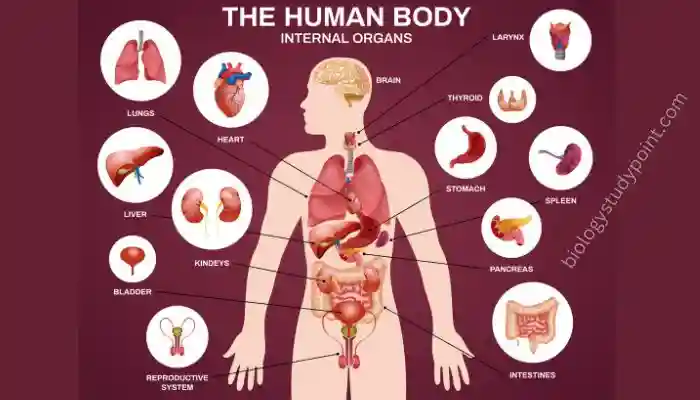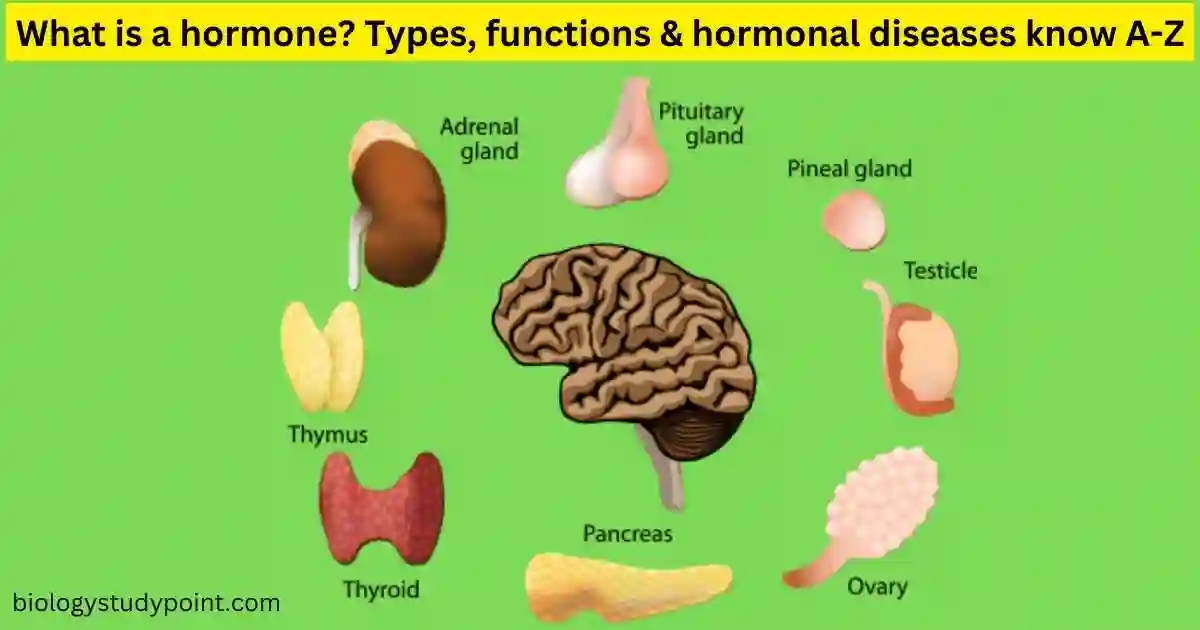“Friends, hormones are essential for our mental and physical health. They regulate various processes in our bodies. Hormones play a crucial role, especially in the reproductive process. Maintaining a balance of hormones in the body is very important because it helps our body function properly.
What is Hormone?
Hormones are a type of chemicals that act as messengers in the body. These hormones are produced from specific types of glands called endocrine glands. These endocrine glands are spread throughout our body. They are ductless glands.
Therefore, the hormones released from these glands directly enter the blood and, through the bloodstream, deliver messages to various parts of the body, such as organs, skin, muscles, and other tissues, coordinating different functions of the body. These messages inform our body about what and when to do, making hormones essential for physical and mental health.
So far, scientists have identified more than 50 hormones in the human body. These hormones play a vital role in maintaining homeostasis in the body.

How many types of hormones?
To control various functions in our body, several types of hormones flow. They are categorized as follows:
- Peptide Hormones
- Steroid Hormones
What are Peptide Hormones?
These hormones are made from amino acids and are soluble in water. Peptide hormones cannot pass through the cell membrane because they have a phospholipid bilayer, preventing the passage of fat-soluble molecules into the cell. Insulin, a hormone released by the pancreas, is an important peptide hormone.
What are Steroid Hormones?
These hormones are soluble in fats and can pass through the cell membrane. Examples include sex hormones like testosterone, estrogen, and progesterone.
Cell Signaling
The effect of hormones and how they are released depends on the type of signaling. Therefore, signaling effects can be divided as follows:
- Autocrine: These hormones work on the same cell from which they are released.
- Paracrine: These hormones work on nearby cells without entering the bloodstream.
- Endocrine: These hormones are produced within the cell and work within the same cell as intracellular messengers.
- Endocrine: These hormones are released from endocrine glands into the blood and work on their target cells through the bloodstream.
Where do hormones come from?
As I mentioned earlier, hormones are released from the specific glands called endocrine glands. These glands do not have ducts, so hormones directly enter the blood and work on their target cells. Glands produce one or more substances, such as hormones, digestive juices, tears, or sweat.
Some major endocrine glands found in our body are:
- Hypothalamus
- Pituitary gland
- Pineal gland
- Thyroid gland
- Parathyroid glands
- Adrenal glands
- Pancreas
- Testes and ovaries
Some other organs or tissues that produce hormones or hormone-like substances but do not fall under the endocrine system:
- Fat tissues
- Kidneys
- Liver
- Intestines
- Placenta
Hypothalamus gland
The hypothalamus gland primarily controls our body temperature. It also regulates hunger, thirst, emotions, sleep, and mood, and gives instructions for hormone secretion. The hypothalamus is a small part of our brain connected to the pituitary gland through the pituitary stalk. It produces the following hormones:
- Corticotropin-releasing hormone
- Growth hormone-releasing hormone
- Dopamine
- Oxytocin (produced by the hypothalamus but stored and released by the pituitary gland)
- Gonadotropin-releasing hormone
- Somatostatin
- Thyrotropin-releasing hormone
Pineal Gland
Also known as the “Thalamus Gland,” it secretes melatonin, a derivative of serotonin, which affects the sleep pattern, helping control the cycle of sleeping and waking. It is a small gland located under the posterior part of the corpus callosum in the brain.
Parathyroid Gland
The main function of this gland is to produce parathyroid hormone (PTH), which helps control the level of calcium in our body.
Thymus Gland
This gland produces T lymphocytes, which play a crucial role in the immune system’s function. It also supports the thymus to mature.
Thyroid Gland
The hormone released from this gland affects heart rate and methods of burning calories. The thyroid gland is small and butterfly-shaped, located below the skin in front of the neck. It produces the following hormones:
- Thyroxine (T4)
- Triiodothyronine (T3)
- Reverse triiodothyronine (RT3)
- Calcitonin

The collective term for thyroxine and triiodothyronine hormones is “thyroid hormones.”
Adrenal Glands
The hormones released from this gland control sex drive, cortisol, and stress levels. It is also called the suprarenal glands. They are small, triangular-shaped glands located on top of each kidney.
Our adrenal glands produce the following hormones:
- Cortisol
- Adrenaline (Epinephrine)
- Norepinephrine
- Aldosterone
- DHEA and androgens
Pituitary Gland
Also known as the “Master Control Gland” because it helps control other glands. It also produces hormones that promote growth and development.
The pituitary gland is a pea-sized gland located at the base of our brain, behind the nose, and below the hypothalamus. It has two lobes: the anterior lobe and the posterior lobe. Our pituitary gland releases several types of hormones, many of which control the functions of other endocrine glands.
The anterior pituitary releases the following six types of hormones:
- Follicle-stimulating hormone (FSH)
- Adrenocorticotropic hormone (ACTH or corticotropin)
- Growth hormone (GH)
- Thyroid-stimulating hormone (TSH)
- Luteinizing hormone (LH)
- Prolactin
The posterior pituitary releases the following hormones:
- Antidiuretic hormone (ADH or vasopressin)
- Oxytocin”
Pancreas
Insulin hormone is released from this gland, which maintains the sugar levels in the blood. A deficiency of this hormone leads to diabetes. The pancreas contains islet cells that produce the following hormones:
- Insulin.
- Glucagon.
Testes
These are present in males and produce the sex hormone testosterone. Additionally, they also produce sperm.
Ovary
This is present in females in the reproductive system and produces estrogen, testosterone, progesterone, and other female sex hormones.
Fatty Tissue
This tissue is also known as adipose tissue, which is present throughout our body. It is located between the skin and muscles, around internal organs, in breast tissue, and in the bone marrow.
The fatty tissue secretes the following hormones:
- Leptin.
- Estrogen.
- Angiotensin.
- Adiponectin.
- Plasminogen activator inhibitor-1.
Kidney
Our kidneys are two excretory organs shaped like beans that filter our blood and produce urine. Additionally, they also produce some hormones, which are:
- Erythropoietin.
- Renin.
- Active form of vitamin D (Vitamin D is a prohormone that our body converts into a vitamin).
Liver
The liver is an essential organ and gland in our body. It produces digestive juices that help in digestion, so the liver is considered part of the digestive system. Additionally, it also produces hormones, which are:
- Angiotensinogen.
- Insulin-like growth factor 1 (IGF-1).
- Intestines (Gastrointestinal Tract)
Placenta
The placenta develops in the uterus of the female during pregnancy, providing oxygen and nutrients to the developing fetus. To maintain pregnancy, the placenta produces progesterone and estrogen hormones.
All these glands work together to regulate hormone secretion and management for our body.
Only a small amount of hormone is needed for significant changes in the body. These glands also secrete hormones in very small quantities. An excess or deficiency of hormones in the body can lead to various health conditions.
What are the functions of Hormones?
Some important functions of hormones are as follows:
They act as chemical messengers and influence and regulate many processes in our bodies. They also regulate our food digestion, body temperature, growth and development, hunger and thirst, mental state, and cognitive functions, and initiate sexual development and reproduction, among other functions.
Hormonal Disorders
When our endocrine glands do not function properly, several hormonal disorders can occur in our body. Normal hormonal regulation is associated with our hypothalamus, pituitary glands, and related glands. Excess or deficiency of hormones these glands produce can significantly affect growth, development, and digestion. Disruption in hormonal balance can lead to diseases like osteoporosis, hyperthyroidism, and diabetes.
Responsible factors for hormonal diseases can be environmental, dietary, and genetic. Testing for hormonal diseases is done in laboratories and based on specific characteristics. To diagnose hormone-related diseases, tests can be done on bodily fluids such as blood, saliva, or urine in a laboratory.
When an individual has a hormone deficiency, synthetic hormone replacement therapy can be used. When there is an excess of hormones, medications are used to reduce or stop the effects of hormones. For example, when there is a deficiency of thyroxine hormone produced by the thyroid gland, synthetic thyroxine is given in tablet form for treatment. When there is an excess of its effects, medications like propranolol can be used to reduce or prevent its effects.
List of Important Hormones
- Cortisol: This hormone helps respond to stress in our body, also called the stress hormone. It is involved in increasing our blood sugar levels, heart rate, etc.
- Estrogen: This hormone is produced in females and is also called the main sex hormone because it brings puberty and prepares the female body and uterus for pregnancy. Not only that, it also controls the menstrual cycle, and the level of this hormone changes during periods, causing many inconvenient symptoms in women.
- Melatonin: This hormone primarily controls our sleep and wake cycles.
- Progesterone: This is also a sex hormone produced in females responsible for pregnancy, and the menstrual cycle, and also responds to fertilization.
- Testosterone: This is a sex hormone produced in males that brings about puberty in males. It also increases muscle mass in males. Besides strengthening bones and muscles, it also controls the development of facial hair in males.
Why is it called a Chemical Messenger?
It is called a chemical messenger because it is a chemical substance and mainly works as a messenger. The hypothalamus is the foremost part of the brain. This part contains a large number of neurosecretory cells. These cells produce neurohormones. They stimulate the anterior lobe of the pituitary gland to produce many other hormones.
What conditions arise due to hormone-related problems?
Many medical conditions arise due to hormone-related problems. Having too much or too little hormones can cause symptoms and issues in a person’s health. Treatment is necessary when hormones are either excessive or deficient. Some hormone-related problems include:
- Diabetes and gestational diabetes.
- Thyroid disorders include hyperthyroidism (excess thyroid hormone) and hypothyroidism (low thyroid hormone).
- Irregular menstrual cycles (periods), polycystic ovary syndrome (PCOS), amenorrhea, and anovulation.
- Obesity.
- Male infertility – specifically, low testosterone levels (hypogonadism).
- Female infertility.
What causes hormonal imbalance?
Various factors can cause hormonal imbalance. Typically, the causes of hormonal imbalance include the following conditions:
- Tumors, adenomas, or other growths.
- Damage or injury to endocrine glands.
- Autoimmune conditions.
- Genetic mutations that affect endocrine gland structure/function.
Conclusion
I hope you found the information provided in this article about hormones helpful. If you liked this article, please share it with your friends on Facebook and WhatsApp groups.”
Thank you so much
